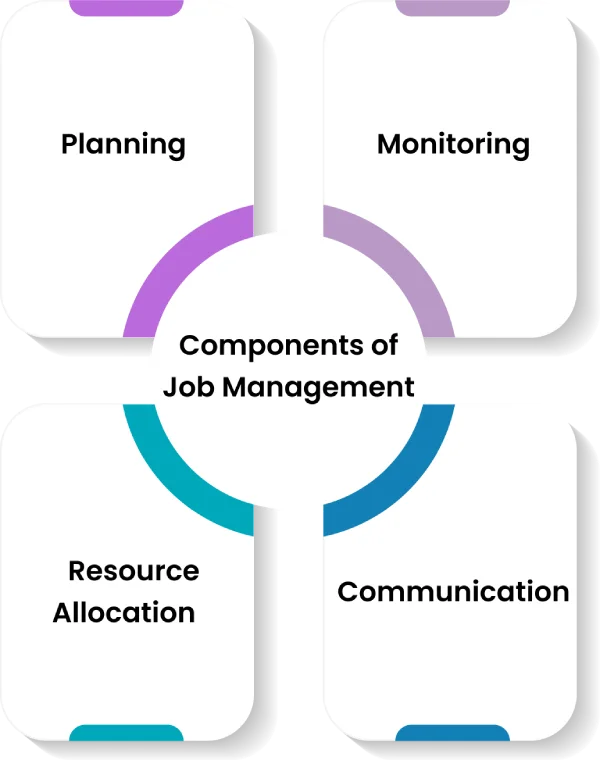Despite the size or industry, job management is crucial for any organization's operation. Job management is a process of planning, allocating, scheduling, and managing a multitude of tasks and roles that are mandated to people or teams to complete the work to accomplish an efficient task completion. Job management increases productivity, keeps accountability, and encourages better communication.
As our workplaces become more tech friendly and fast paced, job management plays an important role in tackling countless workflow and deadlines. Good job management practices in almost every sector from IT to health care has allowed team members or individuals to stay on task, deliver better results, and be adaptable to change.
Job management is a process for planning, scheduling, tracking and controlling work or tasks within a company to facilitate efficient completion of objectives in a timely manner while also remaining true to the company's goals and vision. Job management is more than just identifying who is completing what tasks, it includes a range of strategies to help a business know how best to assign and allocate resources, capacity or time, how to track performance and fluctuations within the ongoing and dynamic environment. This often includes tools and software to assist not only with task or job scheduling, assignment and deadlines, but also to track job progress.
The main goal of job management is to increase efficiency and provide a greater sense of responsibility and accountability to group members and individuals. A formalized and systematic approach to job management can help reduce confusion and establish a clearer picture of what everyone is responsible for. Strategic job management allows for individual tasks to be related to and aligned with the overall goals and vision of the business. Job management increases visibility for managers as there is one place to see progress and identify problems, which will lead to better decision making. Job management becomes extremely practical and useful in more complex situations like when team members are located in disparate geographic locations where coordination and accountability are absolutely required.

1. Planning: It includes defining various roles, setting objectives, assigning responsibilities to individuals as well as to teams.
2. Monitoring: Real time tracking the progress of tasks allotted
3. Resource Allocation: Assigning efficient workforce and tools for each task
4. Communication: Facilitate coordination and collaboration, enable real time feedback and updates.
1. Increase in Efficiency: Well organised distribution of tasks and its scheduling ensure that the assigned work progresses without delays.
2. Utilization of Resources: Effective job management ensures the usage of resources like manpower, tools and time optimally without overburdening individuals or teams.
3. Better Decision Making: Time to time progress reports and work analysis gives a comprehensive idea of the tasks and allows us to make informed choices.
4. Enhances Communication and Collaboration: Job management allows employees to share updates, documents, progress reports and feedback with each other even if they work remotely which ensures smoother teamwork.
Despite having various benefits, job management can pose challenges and some are listed below: -
1. Availability of Adequate tools: Many companies don’t have access to adequate tools and systems that will help them to implement effective strategies for management of jobs and tasks.
2. Inability to Adapt: Employees may find it harder to adapt with a new work environment which is tech driven and they are not comfortable enough to cope up with constant evolution in the industry.
3. Data Overload: Job management tools collect a lot of data which includes employee performance, task status, time spent to complete tasks etc. Sometimes these data are not presented properly which can be overwhelming and leads to difficulty in decision making.
4. Data Privacy Concerns: Many jobs management tools store important data about employees, tasks, clients and company’s operation. This raises a serious concern regarding proper security and data privacy measures.

1. Identify Organisational Needs: Assessing needs and current challenges an organisation is facing in managing tasks and projects.
2. Defining Job Roles: After assessing needs and challenges, roles and responsibilities of each employee should be assigned based on their areas of interest and expertise. Clearly outline their tasks and who they report to with progress and completion. This will prevent confusion and ensure that work is done smoothly with proper accountability.
3. Choosing Job management system/tool: Selection of an adequate system or tool for job management is a necessary step. Tools should be selected that suit an organisation’s size, industry and complexity.
4. Training of Employees: Conducting training of individuals working in a business is important as it ensures all employees understand the usage of the new job management system.
5. Monitoring Performance and Progress: Tracking of tasks progress and individuals’ performance regularly will boost efficiency and adapt easily with evolving needs of the organisation.
1. IT industry: In software development or IT industry, job management helps to manage projects, develop software, track bugs and monitor progress.
2. Healthcare: Job management ensures that doctors and nurses are assigned to the right tasks and responsibilities meeting patient's needs. It helps in tracking appointments, assigning medical procedures and monitoring patient progress.
3. Education: Job management in the education sector helps by scheduling classes, tracking assignments, planning school events and activities, marking attendance and distributing staff duties.
Time Champ is a powerful tool for job management which is designed to help organisations and businesses boost productivity and streamline workflows. Time Champ helps in monitoring job progress in real time, assigning tasks to individuals or teams and generating automated reports which are helpful for effective decision making.
Time Champ provides various tools to increase performance, reduce wastage of time, track task deadlines and employee performance. It is also user-friendly as it facilitates hybrid or remote work setups. Overall, Time Champ makes job management easier, faster, smarter and more result driven resulting in empowering your team to do their best every day.